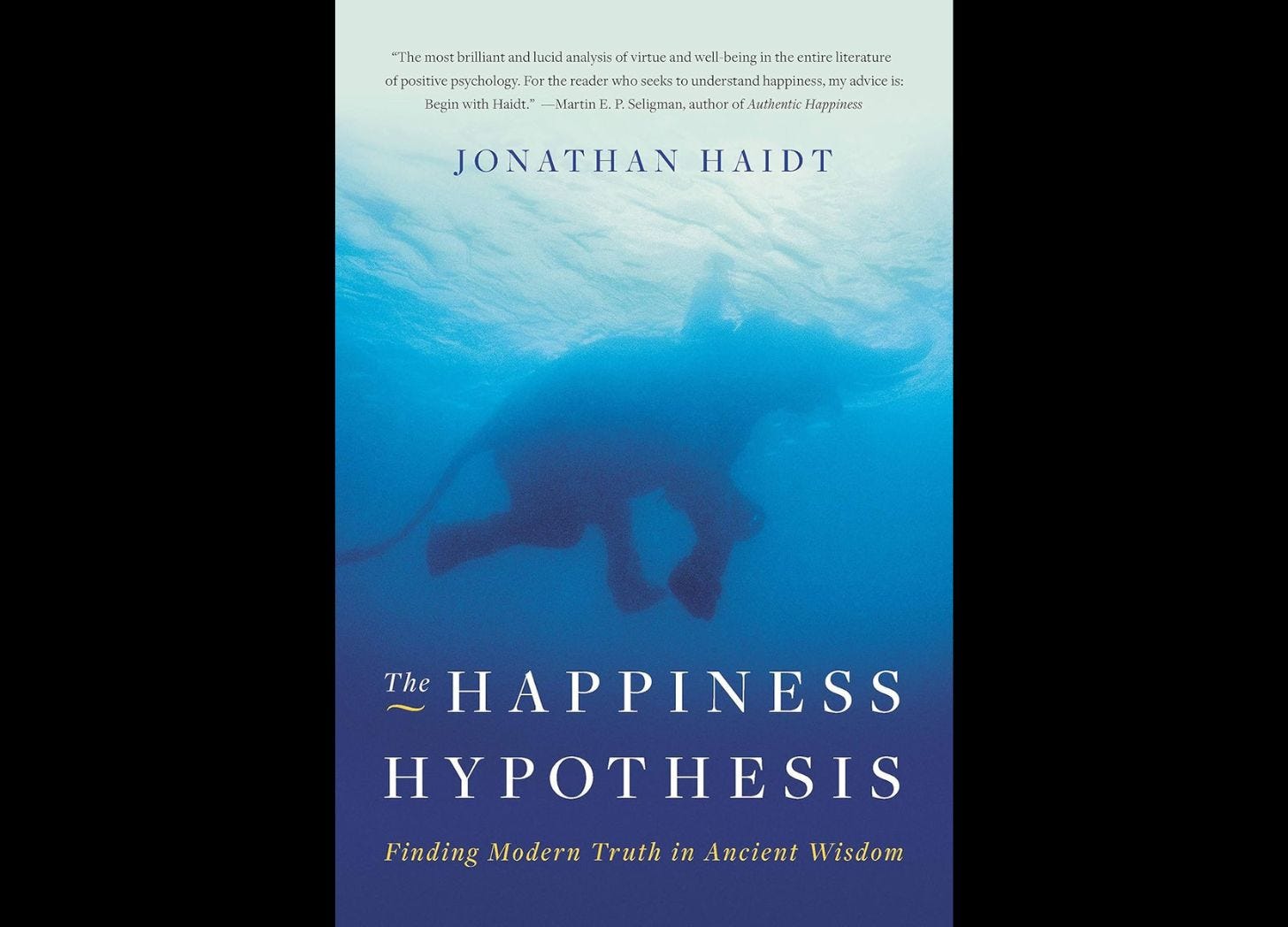Book Byte #235 "The Happiness Hypothesis" by Jonathan Haidt
Finding Modern Truth in Ancient Wisdom
📣 Curious Quotes from the Author
“Love and work are to people what water and sunshine are to plants.”
“If you are in passionate love and want to celebrate your passion, read poetry. If your ardor has calmed and you want to understand your evolving relationship, read psychology. But if you have just ended a relationship and would like to believe you are better off without love, read philosophy.”
“Happiness is not something that you can find, acquire, or achieve directly. You have to get the conditions right and then wait. Some of those conditions are within you, such as coherence among the parts and levels of your personality. Other conditions require relationships to things beyond you: Just as plants need sun, water, and good soil to thrive, people need love, work, and a connection to something larger. It is worth striving to get the right relationships between yourself and others, between yourself and your work, and between yourself and something larger than yourself. If you get these relationships right, a sense of purpose and meaning will emerge.”
“Those who think money can't buy happiness just don't know where to shop … People would be happier and healthier if they took more time off and spent it with their family and friends, yet America has long been heading in the opposite direction. People would be happier if they reduced their commuting time, even if it meant living in smaller houses, yet American trends are toward even larger houses and ever longer commutes. People would be happier and healthier if they took longer vacations even if that meant earning less, yet vacation times are shrinking in the United States, and in Europe as well. People would be happier, and in the long run and wealthier, if they bought basic functional appliances, automobiles, and wristwatches, and invested the money they saved for future consumption; yet, Americans and in particular spend almost everything they have – and sometimes more – on goods for present consumption, often paying a large premium for designer names and superfluous features.”
“Work on your strengths, not your weaknesses. How many of your New Year’s resolutions have been about fixing a flaw? And how many of those resolutions have you made several years in a row? It’s difficult to change any aspect of your personality by sheer force of will, and if it is a weakness you choose to work on, you probably won’t enjoy the process. If you don’t find pleasure or reinforcement along the way, then—unless you have the willpower of Ben Franklin—you’ll soon give up. But you don’t really have to be good at everything. Life offers so many chances to use one tool instead of another, and often you can use a strength to get around a weakness.”
“There is nothing either good or bad, but thinking makes it so.”
“Letting off steam makes people angrier, not calmer. Pennebaker discovered that it’s not about steam; it’s about sense making. The people in his studies who used their writing time to vent got no benefit. The people who showed deep insight into the causes and consequences of the event on their first day of writing got no benefit, either: They had already made sense of things. It was the people who made progress across the four days, who showed increasing insight; they were the ones whose health improved over the next year.”
“Each of us thinks we see the world directly, as it really is. We further believe that the facts as we see them are there for all to see, therefore others should agree with us. If they don’t agree, it follows either that they have not yet been exposed to the relevant facts or else that they are blinded by their interests and ideologies.”
“What we are today comes from our thoughts of yesterday, and our present thoughts build our life of tomorrow: our life is the creation of our mind. —BUDDHA”
“The rider evolved to serve to the elephant.”
“Words of wisdom, the meaning of life, perhaps even the answer sought by Borges's librarians—all of these may wash over us every day, but they can do little for us unless we savor them,engage with them, question them, improve them, and connect them to our lives”
📚 Cognition of the Book’s Big Idea
Understanding people in general and our own personalities in particular will help us be happier. We can then use that knowledge to make improvements in our lives. Follow your passion. You'll be happier in the long run if you chose a job because you enjoy it rather than just because it pays well. Examine your personal ideas and values to determine what kind of work you genuinely enjoy doing, then hunt for a position that fits with these. We usually love the task that we find fulfilling.
Examine your own shortcomings.
The next time you're having a disagreement with a friend or your partner, try examining your own shortcomings instead of concentrating just on theirs. Just list the things you know you did incorrectly; you don't have to acknowledge full responsibility. This will be a significant step toward settling the dispute.
My Software Stack: I use Skool for my Online Community Platform and ClickFunnels for my Landing Pages, Payments, and Email Sequencing. I use Substack for my Newsletter and Taskade for AI Note Taking/Second Brain/Project Management. I use my Personal Amazon Store for Tech and Book Recommendations.
Try out the "Think and Grow Rich Challenge" by Russell Brunson and Learn more about the First Self Help Author Napoleon Hill

